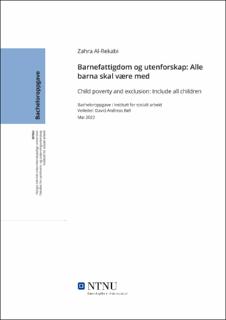| dc.contributor.advisor | Bell, David Andreas | |
| dc.contributor.author | Al-Rekabi, Zahra | |
| dc.date.accessioned | 2022-06-25T17:20:38Z | |
| dc.date.available | 2022-06-25T17:20:38Z | |
| dc.date.issued | 2022 | |
| dc.identifier | no.ntnu:inspera:111265159:46795345 | |
| dc.identifier.uri | https://hdl.handle.net/11250/3000911 | |
| dc.description.abstract | I dag lever store antall barnefamilier under fattigdomsgrensa i Norge. En stor andel av disse barna har innvandrerbakgrunn, og møter derfor flere utfordringer enn etnisk norske barn som vokser opp i lavinntektsfamilier. Blant annet vansker med språk og integrering. I mange lavinntektsfamilier finner foreldrene seg nødt til å prioritere dekning av barnas primære, fysiologiske behov framfor sosiale behov. Og i innvandrerfamiliene prioriterer flere foreldre barnas kulturelle tilknytning. Som konsekvens av dette taper barna muligheten til å delta i sosiale arena som fritidsaktiviteter, og opplever dermed ulike former for utenforskap og følelser av ensomhet. En oppvekst preget av fattigdom og lite sosial aktivitet kan påvirke livskvaliteten og den dagligdagse hverdagen til barn og unge på mange ulike måter, og det er nettopp dette jeg vil diskutere i oppgaven. Jeg vil se på konsekvensene av mangel på et støttende nettverk av relasjoner i barnets nærmiljø. Oppgaven diskuteres i lys av Pierre Bourideus teori om kapital. Oppgaven fokuserer aller mest på viktigheten av sosial kapital for barns deltakelse, men ser samtidig på sammenhengen mellom kapitalene (økonomisk, kulturell & sosial) og hvordan disse tre sammen kan påvirke barnet på ulike livsområder. Oppgaven tar for seg hvordan økonomisk kapital åpner veien for tilegnelsen av sosial og kulturell kapital på det vis at foreldrene betaler for- og motiverer barna til sosial deltakelse, og bistår i- og er engasjert i deres utdanning. Denne typen oppdragelse gjør at kapital- og sosial ulikhet reproduseres, eller går i arv.
Oppgaven er en litteraturstudie basert på allerede eksisterende forskning. Oppgaven forsøker å beskrive omfanget kapital har på oppveksten, utviklingen og identiteten til barnet. Jeg ser på hvordan lek, vennskap og aktivitet gir mulighet til å kjenne på tilhørighet, samhold og fellesskap og til etablering av sosiale relasjoner og oppbygging av nettverk. Gjennomgående i oppgaven bruker jeg ulike barns personlige opplevelser i møte med fattigdommens begrensninger. | |
| dc.description.abstract | Today, a large number of families and their children live below the poverty line in Norway. A large proportion of these families have an immigrant background, and therefore face more challenges than ethnic Norwegian children who grow up in low-income families. For instance difficulties with language and integration. In many low-income families, parents find themselves forced to prioritize covering their children´s primary, physiological needs over social needs. And in immigrant families, several parents prioritize their children´s cultural connection. As a consequence, children lose the opportunity to participate in social arenas as leisure activities, and thus experience various forms of exclusion and feelings of loneliness. An upbringing characterized by poverty and little social activity can affect the quality of life and everyday life of children and young people in many different ways, and this is exactly what I want to discuss in the thesis. I want to look at the consequences of the lack of supportive network of relationships in the child´s immediate environment. The thesis is discussed in light of Pierre Bourdieu´s theory about capital. The thesis focuses most on the importance of social capital for children´s participation, but at the same time looks at the connection between the capital and how the three capitals (economic, cultural & social) together can affect the child in different areas of life. The thesis deals with how economic capital paves the way for the acquisition of social and cultural capital in the way that parents pay for- and motivate their children to social participation, and assist in and are engaged in their education. This type of upbringing is what leads to the fact that capital can be reproduced, or inherited.
The thesis is a literature study based on already existing research. The thesis tries to describe the extent of capital on the child´s upbringing, development and identity. I look at how play, friendship and community contributes to establishing social relationships and build networks. Throughout the thesis, I use different children´s personal experiences in meeting the limitations of poverty. | |
| dc.language | nob | |
| dc.publisher | NTNU | |
| dc.title | Barnefattigdom og utenforskap: Alle barna skal være med | |
| dc.type | Bachelor thesis | |
